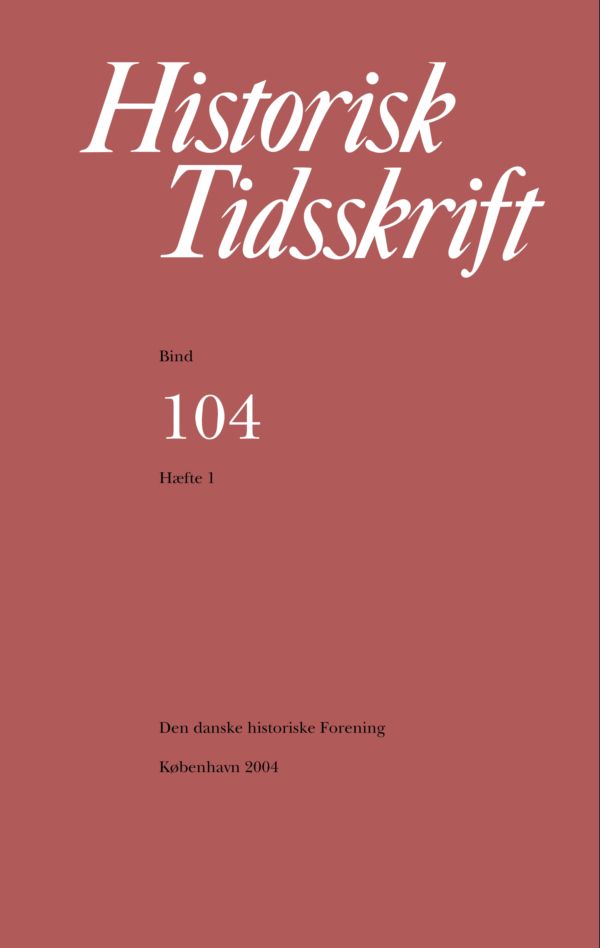Amleds rolle i Saxos Danmarkshistorie
Resumé
Amled's Role in Saxo's History of the DanesSaxo's representation in Gesta Danorum (History of the Danes, c. 1200) of the ancient myths and legends, prehistory and contemporary history of Denmark, should not only be appreciated for its brilliant style and as a source of knowledge on its subject matter. An essential aspect of Saxo's oeuvre is the integration of its narrative qualities into a persuasive political and cultural statement. Saxo's tale justified the established order of a society ruled by his friends and relations. Also, by the richness of his material and his own erudition and literary skills, it gave evidence of the advanced status of the Nordic realm in a European context.The present article demonstrates these qualities by analyzing a particular - and particularly famous - part of Gesta: The tales about Amled - which Shakespeare transformed into the tragedy of Hamlet. By comparing the variants from the medieval tradition, primarily Annales Ryenses, it is shown that in all probability Saxo, in his turn, also transformed a received tradition in order to serve a specific purpose. By altering the circumstances of location and kinship the events of the legend were set in a feudal framework, consistent with the centralized Danish monarchy of Saxo's time. Amled was depicted with the familiar heroic qualities and did perform amazing feats; only in the end he met his destiny, slain in battle and buried in all but oblivion for having declined morally and failed the obligations of fealty to the Danish King. Various means are used in order to render the story, constructed for politically edifying purposes, meaningful to the reader. Firstly, of course, the events are colourful and entertaining. Secondly, the final downfall of Amled is imbued with a mood of sympathy towards a protagonist who, first robbed of his father and rightful position, had displayed courage and ingenuity to regain everything, only in order to lose it all when he was on the verge of perpetual fame, exceeding even that of his likewise splendid ancestors. The circular pattern of the story, curiously spread over two parts of Gesta, and its genuinely human qualities, stand in considerable contrast to many other episodes in Gesta, focused on the lives of kings. Thirdly, the narrative is adorned by allusion to classical material and by directly using material from the same tradition. The fate of Amled's father - a glorious life, ended by treason and finally rewarded by immortal fame - seems somewhat parallel to that of Hercules. The application of this device lends further depth to Amled's own fate, which is the reverse or negative image of the one which befell the superior hero of the classical world. The cunning of Amled, especially seen in the way he used to conceal his mental faculties until the right moment had arrived, may be part of the original legend, but is evidently being illustrated by recycling elements from Livius and Valerius Maximus. The article even discusses the place of the Amled-episode in the entire composition of Gesta as well as the Old English and Norse sources of other vital components of the action. It concludes by restating and affirming the purposeful and deliberate nature of Saxo's writing.Downloads
Publiceret
Citation/Eksport
Nummer
Sektion
Licens
Ophavsret til bidrag i Historisk Tidsskrift tilhører forfatterne og Den danske historiske Forening som udgiver af Historisk Tidsskrift. For illustrationer gælder den ophavsret, som står anført i billedteksten. Ophavsretslovens almindelige bestemmelser gælder, hvilket vil sige, at ophavsretten gælder i 70 år efter forfatterens død. Bidrag i Historisk Tidsskrift må derfor, med forbehold for en ”moving wall” på tre år, frit downloades, læses, gemmes, anvendes og citeres (med kildeangivelse) i privat og videnskabelig sammenhæng, men de må ikke helt eller delvis genudgives af tredjepart, heller ikke i redigeret form, uden tilladelse fra forfatterne og Den danske historiske Forening. Henvendelse skal i så fald rettes til Historisk Tidsskrifts redaktion på histtid@hum.ku.dk.





